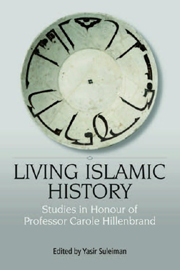Book contents
- Frontmatter
- Contents
- Acknowledgements
- Professor Carole Hillenbrand: List of Publications
- Preface
- 1 The Origin of Key Shi‘ite Thought Patterns in Islamic History
- 2 Additions to The New Islamic Dynasties
- 3 Al-Tha‘alibi's Adab al-muluk, a Local Mirror for Princes
- 4 Religious Identity, Dissimulation and Assimilation: the Ismaili Experience
- 5 Saladin's Pious Foundations in Damascus: Some New Hypotheses
- 6 The Coming of Islam to Bukhara
- 7 A Barmecide Feast: the Downfall of the Barmakids in Popular Imagination
- 8 The History of the Patriarchs of the Egyptian Church as a Source for the History of the Seljuks of Anatolia
- 9 Genealogy and Exemplary Rulership in the Tarikh-i Chingiz Khan
- 10 Vikings and Rus in Arabic Sources
- 11 Qashani and Rashid al-Din on the Seljuqs of Iran
- 12 Exile and Return: Diasporas of the Secular and Sacred Mind
- 13 Clerical Perceptions of Sufi Practices in Late Seventeenth-Century Persia, II: Al-Hurr al-‘Amili (d. 1693) and the Debate on the Permissibility of Ghina
- 14 On Sunni Sectarianism
- 15 The Violence of the Abbasid Revolution
- 16 Nationalist Poetry, Conflict and Meta-linguistic Discourse
- Bibliography
- List of Contributors
- Index
12 - Exile and Return: Diasporas of the Secular and Sacred Mind
Published online by Cambridge University Press: 12 September 2012
- Frontmatter
- Contents
- Acknowledgements
- Professor Carole Hillenbrand: List of Publications
- Preface
- 1 The Origin of Key Shi‘ite Thought Patterns in Islamic History
- 2 Additions to The New Islamic Dynasties
- 3 Al-Tha‘alibi's Adab al-muluk, a Local Mirror for Princes
- 4 Religious Identity, Dissimulation and Assimilation: the Ismaili Experience
- 5 Saladin's Pious Foundations in Damascus: Some New Hypotheses
- 6 The Coming of Islam to Bukhara
- 7 A Barmecide Feast: the Downfall of the Barmakids in Popular Imagination
- 8 The History of the Patriarchs of the Egyptian Church as a Source for the History of the Seljuks of Anatolia
- 9 Genealogy and Exemplary Rulership in the Tarikh-i Chingiz Khan
- 10 Vikings and Rus in Arabic Sources
- 11 Qashani and Rashid al-Din on the Seljuqs of Iran
- 12 Exile and Return: Diasporas of the Secular and Sacred Mind
- 13 Clerical Perceptions of Sufi Practices in Late Seventeenth-Century Persia, II: Al-Hurr al-‘Amili (d. 1693) and the Debate on the Permissibility of Ghina
- 14 On Sunni Sectarianism
- 15 The Violence of the Abbasid Revolution
- 16 Nationalist Poetry, Conflict and Meta-linguistic Discourse
- Bibliography
- List of Contributors
- Index
Summary
Procession and Return, Exile and Return
Down the ages diverse thinkers and scholars, from the Neoplatonist Plotinus (AD 204/5–70) to the Victorian Jesuit poet Gerard Manley Hopkins (1844–89), have identified a flow of procession and return, working, as it were, like a kind of natural law within the universe (McGinn 2007: 46–70.). Bernard McGinn, in a succinct recapitulation, put it like this:
The master paradigm of exitus and reditus, the procession out and return to God, is perhaps natural to the religious mind as it reflects upon the nature of the universe. In Western thought the evolution of this dynamic paradigm was shaped by the way in which Neoplatonic thinkers, both pagan and Christian, sought to express how the First Principle overflows into the universe while at the same time drawing all things back to Itself
(ibid.: 46).In a masterly exposition McGinn shows how ‘pagan Neoplatonic thinkers brought the paradigm of emanation and reversion to a new level of sophistication by their analysis of the three stages of reality’ (ibid.: 47) and how the fundamental ‘triadic paradigm’ at the heart of Neoplatonism could have become ‘Christianized’ in terms of Christian Trinitarian theology (ibid.: 47). The articulation, however, was within a framework which acknowledged the inadequacy of human words confronted by an ineffable mystery (McGinn 2007: 49).
The basic Plotinian triad of The One, Intellect and Soul (Plotinus 1966–88: passim), and the various triads which developed from it, thus ‘spoke’ to a nascent mediaeval Christian theology and could be used to intellectual effect.
- Type
- Chapter
- Information
- Living Islamic HistoryStudies in Honour of Professor Carole Hillenbrand, pp. 178 - 191Publisher: Edinburgh University PressPrint publication year: 2010



